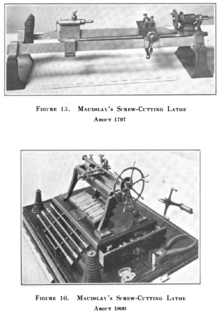
A screw-cutting lathe is a machine (specifically, a lathe) capable of cutting very accurate screw threads via single-point screw-cutting, which is the process of guiding the linear motion of the tool bit in a precisely known ratio to the rotating motion of the workpiece. This is accomplished by gearing the leadscrew (which drives the tool bit's movement) to the spindle with a certain gear ratio for each thread pitch. Every degree of spindle rotation is matched by a certain distance of linear tool travel, depending on the desired thread pitch (English or metric, fine or coarse, etc.).
The name "screw-cutting lathe" carries a taxonomic qualification on its use—it is a term of historical classification rather than one of current commercial machine tool terminology. Early lathes, many centuries ago, were not adapted to screw-cutting. Later, from the Late Middle Ages until the early nineteenth century, some lathes were distinguishable as "screw-cutting lathes" because of the screw-cutting ability specially built into them. Since then, most metalworking lathes have this ability built in, but they are not called "screw-cutting lathes" in modern taxonomy.